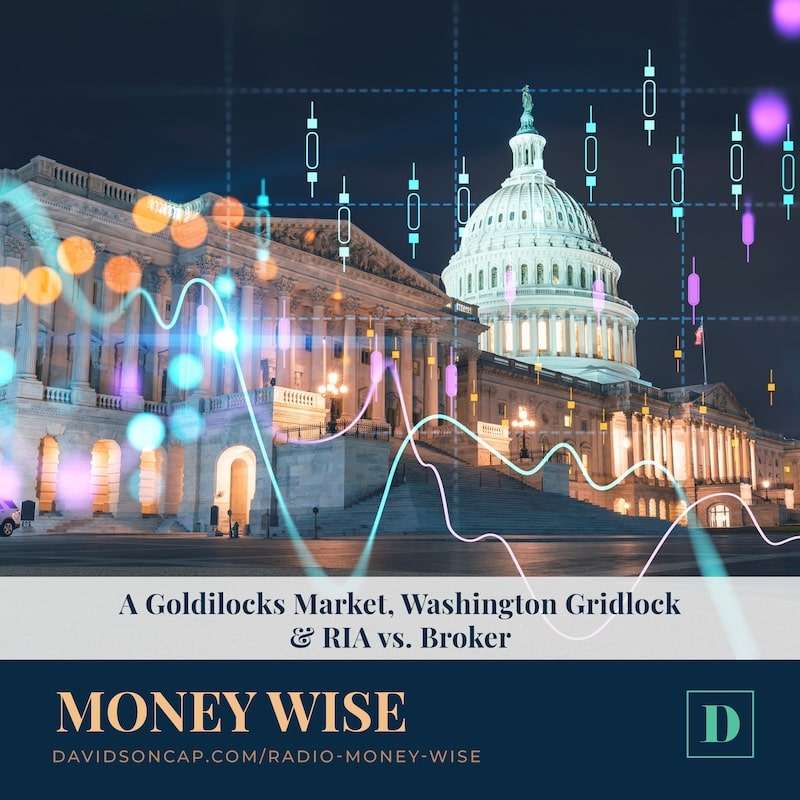Get Educated So You Don’t Set Yourself Up for Failure
Think about the meaning of your retirement assets for a moment. They must – literally – last a lifetime.
The hard truth, though, is that many people will outlive their retirement nest eggs, and that’s because harmful myths persist. In our line of work, we talk to people every day who are setting themselves up for failure because they’re operating on misinformation. That’s why, at Davidson Capital Management, one of our main goals is to educate and enlighten retirees and pre-retirees.
Below, we’ll walk through the top ten retirement planning myths you should stop believing.
10 Retirement Planning Myths You Should STOP Believing
Myth #1: You will not need as much money during retirement as you do right now.
So many retirees think they’ll spend less in retirement, and they’re just plain wrong. Why? Well, the financial entertainment press espouses an industry standard that you’ll only need 70-80% of what you’re spending before you retire. However, there’s one important variable that the legacy distribution system fails to account for, and it’s this: You will have so much more leisure time in retirement. What does that add up to? Well, whether you’re going to be spending your time traveling or simply filling your weeks with golfing, hunting, fishing, or innumerable other common hobbies, your lifestyle won’t be cheap. Of course, you also have the unknown factor of medical expenses as you age, coupled with the fact this it’s very unlikely we will see taxes going down due to the national debt. For these reasons, we firmly believe you need to plan to spend 95-100% of what you’re spending now once you retire.
Myth #2: Your retirement years won’t last that long.
If we all knew when our last day on Earth would be, retirement planning would be much simpler! Of course, none of us know that and so we must use data to help us plan. If you’re 65 right now, you have approximately 21 years left on your life expectancy. Think about that: It means you have a 50/50 chance of living past the age of 86. And, you need a nest egg that will be sufficient to sustain you to that point – or even well beyond. If you mistakenly believe you won’t be retired for very long, and you fail to plan for a rate of withdrawal that will sustain your income to your mid-eighties or beyond, you run the risk of outliving your money.
Myth #3: You can afford to start planning for your retirement a few years before your retirement date.
It cannot be stressed enough: Time is one of your most powerful tools in the accumulation of wealth. That’s why it’s never too soon to begin planning for retirement. The earlier you start, the less you’ll need to save per year to meet your goals, too. Consider this: If you start saving for retirement at age 22 with a goal of $1 million by age 62, you’ll only need to save about $8 per day ($250 per month). Essentially, by brown-bagging your lunch every day instead of eating out, you can retire at age 62 with a million dollars in the bank. Pretty amazing, right? You can learn more about the time value of money in this article.
LISTEN & SUBSCRIBE: The Money Wise Podcast on Apple Podcasts
Myth #4: Social Security will provide enough income for my retirement years.
This statistic comes as a bombshell for many people, but Social Security accounts for only 40% of the average retiree’s income. So, if you’re relying on the federal government to take care of you in retirement, you’re in for a rude awakening. The Social Security system is broken, and it needs a huge overhaul. Cost of living adjustments (COLAs) are getting smaller and smaller, and there’s no guarantee the fund will remain solvent. So, if you’re relying on Social Security to fully provide for you in retirement, you’re setting yourself up to have to work until the day you die.
Myth #5: Your pension plan will provide for your retirement income and you will not need any additional savings.
It is a common – but extremely dangerous – line of thinking that a traditional pension or defined benefit plan will take care of you for the duration of your retirement years. The rise of the 401(k) has meant that most employers no longer offer a pension plan. Even if yours does, there’s no way to know if it’s underfunded. If it’s not, and you get your monthly pension benefit once you retire, you still have to consider the fact that your monthly payments will never be adjusted for monetary inflation. Essentially, from the moment you receive your first pension check, you’re locked in and your money will buy fewer goods and services each month. This erosion of your purchasing power is one of the reasons we always tell our clients to take the lump-sum distribution rollover instead of monthly payments. Doing so gives you full control over your assets, access to your assets, and the ability to invest them in a way that provides you with growth over time.
Myth #6: Medicare will take care of your health insurance needs.
Did you know that Medicare pays for less than three-quarters of the average retiree’s health care costs? You’ll need to budget for some supplemental insurance, and many retirees are paying upwards of $600 per month. If you neglect to build this extra cost into your budget, your retirement nest egg won’t stretch nearly as far as you think it will.
Myth #7: All your assets are in safe vehicles for long-term accumulation and do not need to be watched.
First, you should always be closely monitoring your assets – and it’s best if you can do this alongside a financial professional. Second, let’s think about this: What are “safe vehicles for long-term accumulation” anyway? To some people, that means CDs or government bonds, but they don’t provide capital appreciation opportunities with today’s low-interest rates. They certainly won’t help you keep up with inflation over the long term. The bottom line is that you should be working with a registered investment advisor who can make sure your investments are growing at the rate needed to ensure the longevity of your retirement nest egg and that you aren’t falling asleep at the wheel and setting yourself up for failure once you retire.
SEE ALSO: How to Choose the Best Investment Advisor for You
Myth #8: I can always use the equity in my home to add to my retirement income.
This was a popular thought pattern in 2006-2007 – then we all witnessed the housing collapse. Many people found themselves with next to no value in their homes. This is why, at Davidson Capital Management, we always say that you need to view your house as the place you live – not as an investment. If you’re developing a financial plan for retirement that revolves around taking out a HELOC or a reverse mortgage, you could find yourself in serious trouble down the road. Sure, if you have substantial equity in your home, it could function as a “break glass in case of emergency” sort of asset. In general, though, you should not view your house as a piggy bank that plays a role in your financial plan.
Myth #9: If need be, your family can always help you out.
If you have found yourself thinking this – or even saying it out loud to your children or other family members – consider what it will really feel like to be a burden on your family in your retirement years. Many times, thinking like this is just an excuse for delaying proper retirement planning. It’s never too late to get started, though, so stop procrastinating and start planning and investing so that you can give yourself the gift of true financial independence in retirement.
Myth #10: Money is everything when it comes to retirement planning.
Is money important? Yes, of course! It isn’t everything, though. Consider the fact that you could have a $4 million nest egg and still not have retirement security if you’re spending $400,000 per year on your lifestyle, or if you have high monthly expenses due to significant debt. So, think less about hitting a money target in your retirement planning, and focus more on creating a sustainable plan with what you have to work with. It’s much more about you’re spending than about what you’ve accumulated.
Replace These Myths with a Flexible Retirement Plan
If you’re guilty of believing any of the ten myths above, you’re not alone. These are prevalent ways of thinking that we have seen play out very poorly for retirees time and time again. It’s the reason we feel so strongly about busting harmful retirement planning myths and helping our clients focus on smart, flexible retirement plans that can help them roll with the punches.
Life – and the markets – can change each and every day. You need a thoughtful retirement plan that provides you with income security for the long term. If you want to build a purposeful retirement plan that gives you confidence in your financial future, reach out to us today. At Davidson Capital Management, we have been family-owned and operated since 1989 and we believe in helping you and your family regain the personal aspect of your investment advisory relationship.
Want more content like this article? Check out the Money Wise podcast! Each week, we devote our show to investor education, covering topics on retirement planning and so much more.




